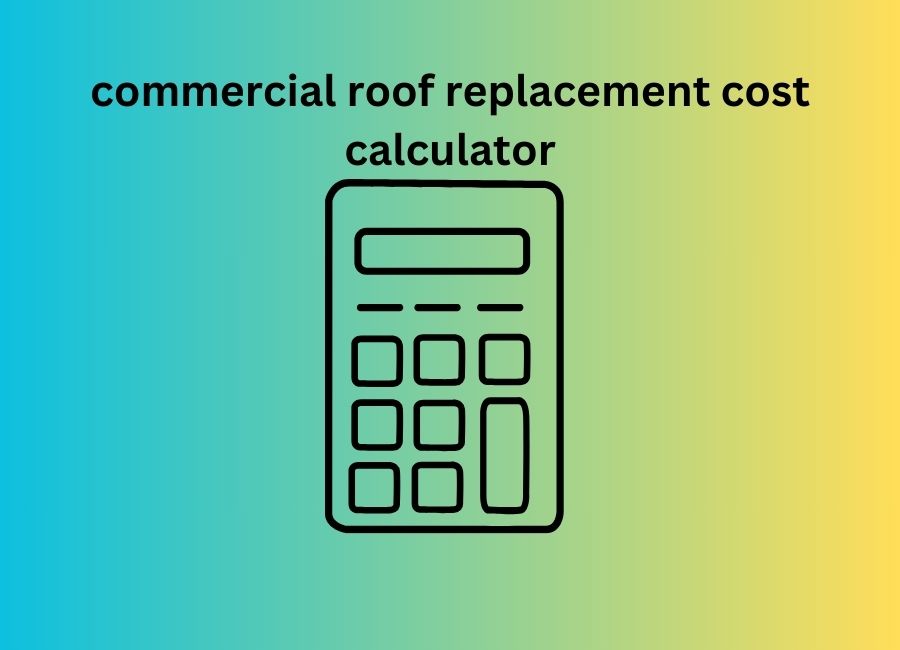Commercial Roof Replacement Cost Calculator
When it’s time to replace a commercial roof, one of the first concerns is often the cost. Roof replacement for commercial buildings is typically more expensive than residential roofs due to the larger size, more complex systems, and varied materials used. However, understanding the factors that influence the price can help business owners make informed decisions. A Commercial Roof Replacement Cost Calculator is a great tool to estimate costs and better plan for the project.
In this article, we’ll break down how a Commercial Roof Replacement Cost Calculator works, the factors that influence commercial roofing costs, and how businesses can use the calculator to estimate expenses accurately.
What Is a Commercial Roof Replacement Cost Calculator?
A Commercial Roof Replacement Cost Calculator is an online tool or app designed to help business owners estimate the cost of replacing their roof. It calculates the total cost based on several factors, including the roof’s size, type of roofing material, labor costs, complexity of the roof, and any additional services needed (such as removing the old roof, permits, or repairs).
The calculator is tailored for commercial roofs, which are often larger and more complex than residential roofs. In addition, the tool takes into account the specific needs of commercial buildings, including durability, energy efficiency, and the type of roof system needed to meet building codes and regulations.
Why Use a Commercial Roof Replacement Cost Calculator?
Replacing a commercial roof is a substantial investment, so it’s important to understand the factors that will influence the total cost. A Commercial Roof Replacement Cost Calculator helps you get an estimate that includes the following benefits:
- Accurate Budgeting: A cost calculator provides an early estimate, helping you set a realistic budget for your project.
- Informed Decision-Making: By understanding the breakdown of the costs, you can make informed decisions regarding roofing materials, contractors, and project timelines.
- Time and Cost Efficiency: A reliable estimate helps you plan ahead and avoid unexpected expenses, reducing the likelihood of delays and overspending.
Key Factors That Influence Commercial Roof Replacement Costs
Several factors contribute to the overall cost of a commercial roof replacement. These factors are important for a Commercial Roof Replacement Cost Calculator to account for to generate an accurate estimate:
1. Roof Size (Square Footage)
The size of the roof is one of the biggest factors influencing cost. The larger the roof, the more materials will be required, and the longer the project will take. Roof size is typically measured in “squares,” where one square equals 100 square feet.
For commercial roofs, the typical range for roof size is quite broad, from a few thousand square feet to tens of thousands, especially for industrial or multi-story buildings. Larger roofs often require specialized equipment and more labor, increasing the cost.
2. Roofing Material
The type of material you choose for the roof plays a significant role in the cost. Commercial buildings use a variety of roofing materials, and each has different price points. Here are some common materials used for commercial roofs:
- Built-Up Roofing (BUR): Built-up roofs consist of multiple layers of asphalt and felt. They are durable but can be expensive, costing between $3 to $6 per square foot.
- Modified Bitumen: A more modern version of BUR, modified bitumen is typically priced between $3.50 to $6 per square foot.
- Single-Ply Roofing (TPO, EPDM, PVC): These systems use large sheets of flexible material, which can cost anywhere from $4 to $8 per square foot, depending on the type.
- Metal Roofing: Metal roofs are highly durable and energy-efficient, costing between $5 to $12 per square foot.
- Spray Foam Roofing (SPF): Spray foam roofs provide excellent insulation and are energy-efficient, generally costing $4 to $7 per square foot.
The choice of roofing material will depend on factors like climate, energy efficiency, building codes, and longevity.
3. Roof Pitch and Complexity
The pitch of a roof (the steepness of the slope) and the complexity of its design will also impact the cost. Flat roofs tend to be less expensive than steeply pitched roofs, as they require fewer materials and are easier to install. However, flat roofs often require extra drainage systems to prevent water pooling.
In addition to pitch, the complexity of the roof also matters. Roofs with features such as skylights, multiple slopes, chimneys, or HVAC systems require additional labor, materials, and time to replace, which increases the overall cost.
4. Labor Costs
Labor costs for commercial roof replacement vary depending on the region, the type of roof, and the contractor’s experience. Labor costs typically range from $50 to $100 per hour depending on where the commercial building is located. Some areas might have higher labor rates due to a high demand for skilled roofers.
For a commercial project, you might need a crew of workers, and the total labor costs will depend on how many hours it takes to complete the job. Labor also includes removal of the old roof, any necessary repairs, and the actual installation of the new roof.
5. Removal of Old Roof
If your commercial building requires roof tear-off (removal of the old roof before installing the new one), this will add to the total cost. Removal costs are generally between $1 to $3 per square foot depending on the complexity of the roof and the materials used.
6. Location and Permits
In certain areas, building codes and regulations may require a permit for roof replacement. The cost of obtaining a permit can range from $100 to $1,000 depending on the location and the size of the building.
7. Additional Services and Features
- Roof Insulation: Adding extra insulation to the roof or upgrading it to meet energy efficiency standards can raise costs.
- Warranty: The type of warranty you choose (e.g., standard or extended) can affect the cost of the roof replacement.
- Energy-Efficiency Features: Green roofs, cool roofing systems, or other energy-saving options can increase the cost of the roof replacement but may provide long-term savings through energy bills.
How to Use a Commercial Roof Replacement Cost Calculator
To use a Commercial Roof Replacement Cost Calculator, follow these steps:
Step 1: Enter Roof Size
- Input the total square footage of the roof to get a baseline for material and labor requirements. You can measure this manually or ask a contractor for an estimate.
Step 2: Select Roofing Material
- Choose the roofing material you plan to use. Most calculators provide a list of common materials and their associated costs per square foot.
Step 3: Specify Roof Pitch and Complexity
- Provide details about the roof’s pitch and complexity (flat, low slope, steep slope, or complex with multiple features). This will help calculate labor and material needs more accurately.
Step 4: Include Removal Costs
- If the old roof needs to be removed, input the cost of roof tear-off (if known) or use the default pricing per square foot for removal.
Step 5: Factor in Labor Costs
- Some calculators allow you to input local labor rates or offer an estimate based on your roof size and complexity. Make sure to account for the number of workers and hours required.
Step 6: Add Permits and Additional Costs
- Include any permit fees or additional services (insulation, energy-efficient features, etc.) that may increase the total cost.
Step 7: Calculate Total Estimate
- After entering all the necessary details, the calculator will provide an estimated cost for replacing your commercial roof.
Example of Commercial Roof Replacement Cost Calculation
Let’s consider an example for a commercial roof replacement:
- Roof Size: 10,000 square feet (100 squares)
- Roofing Material: TPO (Single-ply) at $6 per square foot
- Roof Pitch: Low slope
- Labor Cost: $75 per hour, estimated 150 hours of work
- Old Roof Removal: $2 per square foot
- Permits: $300
Total Cost Breakdown:
- Materials: 100 squares * $6 = $6,000
- Labor: 150 hours * $75/hour = $11,250
- Old Roof Removal: 10,000 square feet * $2 = $20,000
- Permits: $300
- Total Estimated Cost = $37,550
Conclusion
A Commercial Roof Replacement Cost Calculator is a valuable tool for business owners to get a rough estimate of their roof replacement costs. By taking into account factors such as roof size, material choice, labor, and additional services, the calculator provides an accurate estimate to help businesses plan and budget for their roofing project.
While the calculator can give you a solid starting point, it’s essential to consult with a licensed roofing contractor for a detailed, on-site evaluation and quote. This will ensure that all factors are considered, and you can make informed decisions about your commercial roof replacement.

